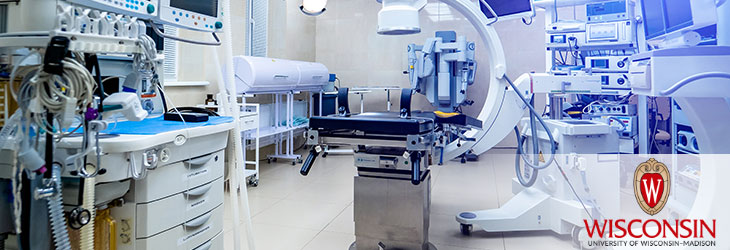
The Wisconsin Alumni Research Foundation is seeking commercial partners to develop an advanced fabrication method for polytetrafluoroethylene (ePTFE) vascular grafts that improves mechanical compliance between the graft and native tissue in small-diameter vascular grafts. With enhanced patency and easy manufacturability, this technology offers a promising solution for vascular surgeries, particularly in cardiovascular disease treatments.
Materials engineering for synthetic vascular grafts to repair damaged or diseased blood vessels is driven by biomimetic innovations that improve biocompatibility and flexibility. A significant challenge to engineering approaches are mechanical mismatches between synthetic and native vascular materials, which can cause blood clots and inflammation that lead to graft failure.
UW-Madison researchers have developed a novel manufacturing technique to enhance the compliance of expanded polytetrafluoroethylene (ePTFE) for vascular graft applications. This new method involves modifying the existing processing procedures by introducing an additional expansion step while using a lower temperature during the first expansion stage. The new process results in the production of highly compliant ePTFE grafts without the need for supplementary additives or inherent material alterations.
Tensile testing in both the longitudinal and circumferential directions as well as cyclical tensile testing were conducted to characterize the mechanical properties of double-expanded ePTFE grafts prepared using varying expansion ratios. The double-expanded ePTFE grafts consistently outperformed the prevailing, single-expanded counterparts in both tensile stress tests and cyclical assessments of its elastic compliance. Notably, the double-expanded ePTFE samples exhibited the desirable, biomimetic “toe-region” and an elastic strain capacity of up to 50%, comparable to native vascular materials. Scanning electron microscopy (SEM) imaging was used to examine the morphological characteristics of the wavy fibers within the double-expanded PTFE samples, which contributed to the enhanced compliance that is needed for vascular graft applications.
- Vascular bypass surgeries: Used when a patient’s own vein is unavailable, particularly in cardiovascular disease treatments
- Small-diameter vascular grafts: For replacing arteries smaller than 6 mm in diameter
- Medical implants: Biocompatible material for long-term use inside the body
- Biocompatible: Highly suitable for use inside the human body with minimal immune response
- Flexibility: Enhanced mechanical flexibility for adaptability to various anatomical conditions
- Improved compliance: Microstructure and mechanical response closer to native vasculature
- Porosity: Allows for gas exchange while preventing fluid leakage, greater adaptability for medical conditions
- Reduced thrombosis risk: Improved compliance and surface properties reduce blood clot formation
- Durability: Withstands long-term use, especially in high-stress environments such as blood vessels
- Easy-to-manufacture: Cost-effective production without the need for additives and/or complex modifications
- Customizable structure: Microstructure can be tailored to mimic natural tissue properties, enhancing graft performance